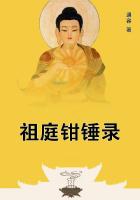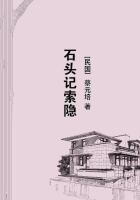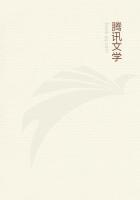In the first place, I doubt very much whether the "literary elect" have been fascinated in great numbers by the fiction in question; but if I supposed them to have really fallen under that spell, I should still be able to account for their fondness and that of the "unthinking multitude" upon the same grounds, without honoring either very much. It is the habit of hasty casuists to regard civilization as inclusive of all the members of a civilized community; but this is a palpable error. Many persons in every civilized community live in a state of more or less evident savagery with respect to their habits, their morals, and their propensities; and they are held in check only by the law. Many more yet are savage in their tastes, as they show by the decoration of their houses and persons, and by their choice of books and pictures; and these are left to the restraints of public opinion. In fact, no man can be said to be thoroughly civilized or always civilized; the most refined, the most enlightened person has his moods, his moments of barbarism, in which the best, or even the second best, shall not please him. At these times the lettered and the unlettered are alike primitive and their gratifications are of the same ****** sort; the highly cultivated person may then like melodrama, impossible fiction, and the trapeze as sincerely and thoroughly as a boy of thirteen or a barbarian of any age.
I do not blame him for these moods; I find something instructive and interesting in them; but if they lastingly established themselves in him, I could not help deploring the state of that person. No one can really think that the "literary elect," who are said to have joined the "unthinking multitude" in clamoring about the book counters for the romances of no-man's land, take the same kind of pleasure in them as they do in a novel of Tolstoy, Tourguenief, George Eliot, Thackeray, Balzac, Manzoni, Hawthorne, Mr. Henry James, Mr. Thomas Hardy, Senor Palacio Valdes, or even Walter Scott. They have joined the "unthinking multitude," perhaps because they are tired of thinking, and expect to find relaxation in feeling--feeling crudely, grossly, merely. For once in a way there is no great harm in this; perhaps no harm at all. It is perfectly natural; let them have their innocent debauch. But let us distinguish, for our own sake and guidance, between the different kinds of things that please the same kind of people; between the things that please them habitually and those that please them occasionally; between the pleasures that edify them and those that amuse them. Otherwise we shall be in danger of becoming permanently part of the "unthinking multitude," and of remaining puerile, primitive, savage. We shall be so in moods and at moments; but let us not fancy that those are high moods or fortunate moments. If they are harmless, that is the most that can be said for them. They are lapses from which we can perhaps go forward more vigorously; but even this is not certain.
My own philosophy of the matter, however, would not bring me to prohibition of such literary amusements as the writer quoted seems to find significant of a growing indifference to truth and sanity in fiction. Once more, I say, these amusements have their place, as the circus has, and the burlesque and negro minstrelsy, and the ballet, and prestidigitation. No one of these is to be despised in its place; but we had better understand that it is not the highest place, and that it is hardly an intellectual delight. The lapse of all the "literary elect" in the world could not dignify unreality; and their present mood, if it exists, is of no more weight against that beauty in literature which comes from truth alone, and never can come from anything else, than the permanent state of the "unthinking multitude."
Yet even as regards the "unthinking multitude," I believe I am not able to take the attitude of the writer I have quoted. I am afraid that I respect them more than he would like to have me, though I cannot always respect their taste, any more than that of the "literary elect."
I respect them for their good sense in most practical matters; for their laborious, honest lives; for their kindness, their good-will; for that aspiration towards something better than themselves which seems to stir, however dumbly, in every human breast not abandoned to literary pride or other forms of self-righteousness. I find every man interesting, whether he thinks or unthinks, whether he is savage or civilized; for this reason I cannot thank the novelist who teaches us not to know but to unknow our kind. Yet I should by no means hold him to such strict account as Emerson, who felt the absence of the best motive, even in the greatest of the masters, when he said of Shakespeare that, after all, he was only master of the revels. The judgment is so severe, even with the praise which precedes it, that one winces under it; and if one is still young, with the world gay before him, and life full of joyous promise, one is apt to ask, defiantly, Well, what is better than being such a master of the revels as Shakespeare was? Let each judge for himself. To the heart again of serious youth, uncontaminate and exigent of ideal good, it must always be a grief that the great masters seem so often to have been willing to amuse the leisure and vacancy of meaner men, and leave their mission to the soul but partially fulfilled. This, perhaps, was what Emerson had in mind; and if he had it in mind of Shakespeare, who gave us, with his histories and comedies and problems, such a searching homily as "Macbeth," one feels that he scarcely recognized the limitations of the dramatist's art. Few consciences, at times, seem so enlightened as that of this personally unknown person, so withdrawn into his work, and so lost to the intensest curiosity of after-time; at other times he seems merely Elizabethan in his coarseness, his courtliness, his imperfect sympathy.

